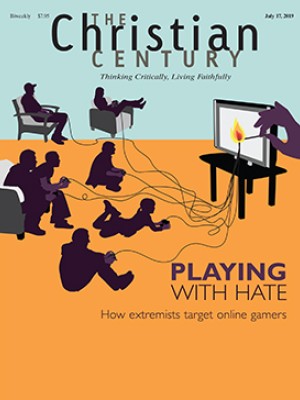Why did I go to a charismatic worship service in an arena?
I feared it would last a week. Then came the moment of truth.

A close friend has a category of engagements she calls “Yes damn”: things you said yes to long ago and as they approach you can’t recall why you’re going or what they want and you’ve got a bunch else to do. So it was that I arrived in the countryside of the European continent for a convention of charismatic Christians. Many had raised their hands to come: 1,300 people in all. The question to which I couldn’t recall the answer was, Why was I there?
My first reaction was that maybe I came to rediscover the 1970s. The music was antediluvian—we even sang “Give Me Oil in My Lamp,” mothballed since the dawn of time. Singers were hugging microphones and swaying like they’d just watched an Abba concert on YouTube. I’d been invited to preach, but I hadn’t been warned that the worship service would go on for three and a half hours.
Read our latest issue or browse back issues.
When the time came, I said my usual stuff. Then the real action began. The 30 or so clergy paired up to offer anointing, laying on of hands, and prayers for healing to all comers. I wanted to say, “Look, I know how to do this stuff. Tuck it into the time it takes to distribute communion. And don’t offer a general invitation to a thousand people on an emotional, sweaty night in a large arena. You’ll be there for a week.” But I kept quiet.
This was new for me. The lack of a time boundary seemed to break the inhibitions of the timid and hesitant. All of human life is in these moments: the single person longing for a partner, the couple who ache for a child, the parents who sigh for their troubled offspring, the daughter who fears for her parents’ marriage, the spouse who anticipates his partner’s dementia, the young person who stumbles over her mental health, the senior who yearns for a faith she’s never had. My prayer partner and I alternated the ministry of word and touch, growing in respect for each other the deeper we traveled into the souls of good people.
And then came the moment of truth. There was a humble request, set in the context of a decade of struggle, the individual’s winsome honesty accompanied by uncontrollable and utterly appropriate tears. My partner and I listened for a long time, as the open-ended ministry time was finally drawing to a close elsewhere in the room. Then hesitantly, gently, fearfully, her eyes searched mine for permission: “I think—I feel—we must pray . . . for a miracle.”
My heart stopped. Would this be exaggerating, leading the vulnerable along, exceeding our brief, trespassing into that other kind of healing with its fireworks and shouting and sudden cures? But then a deeper reality struck me. This moment summed up the church of our day: surrounded by grief and sorrow yet still somehow here, circumscribed by pastoral appropriateness and the management of expectations, fearful of intimacy and genuine touch, yet with a faint recollection that this all started with a miracle, and a distant hope that maybe those days are not completely gone.
“Yes,” I replied with a smile, almost overwhelmed by emotion. I sensed I was being asked if, apart from being a pastor and theologian, I was actually a Christian, who truly believed in the power of God—or at least recognized that distinguishing between our deepest needs and our most urgent wants was God’s business and not mine. “Yes,” I responded, “we must.” And we did.
I was asked to distribute communion. Understanding that some people would require gluten-free bread, the community had decided that all would receive it. I was handed an enormous dish of around 300 prebroken pieces of consecrated gluten-free bread. I stood at the head of one aisle as the people of God streamed toward me.
Without thinking, I held the dish as I do when offering a gluten-free alternative at my own church—proffered toward the communicant, lest the intervention of my own hands contaminate the process. So each recipient, some cottoning on quicker than others, set aside the habit of receiving and instead bent over the dish and chose which broken piece was to be their form of communion. One by one each of the broken, dignified people with whom I prayed minutes before lined up and returned to identify themselves in the broken body of Christ.
It came to me that all ministry was in this moment. These people had been taken and broken; my prayer partner and I had blessed them; and now we were all sharing in the feast of grace and truth. They had brought me their griefs and struggles, like bringing gifts to the altar. Now they were bringing their hunger and faith, and they were recognizing, in the broken pieces of bread, their place in God’s heart and God’s place in theirs. And it mattered not that I scarcely spoke their language or that I had begun with the arrogance of one who thought he could judge people by old-fashioned songs or lugubrious liturgy. We were in Isaiah 2, and the nations were streaming to the mountain of the Lord. The body of Christ, made flesh, was being taken and blessed, broken and given, over and again. I had the privilege of being part of it, and I wanted to be part of it forever.
A version of this article appears in the print edition under the title “Broken and blessed.”






